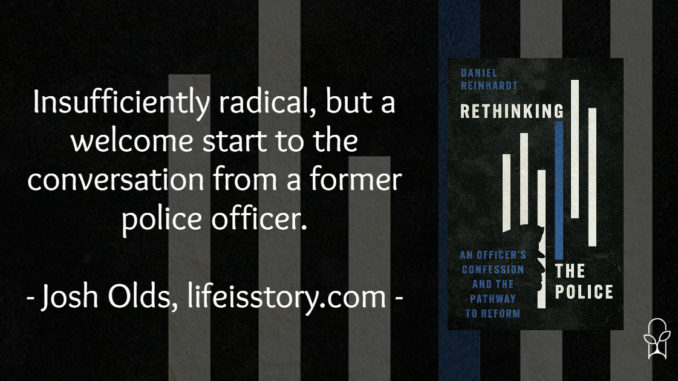
Also by this author: Rethinking the Police: An Officer's Confession and the Pathway to Reform
Published by IVP on November 21, 2023
Genres: Non-Fiction, Social Justice
Buy on Amazon
Goodreads

A former officer grapples with the reality of our broken police culture
Our society has long been stuck in cultural and ideological battles about police brutality and the police force's broken relationship with our communities. Rethinking the Police promises to start a more hopeful conversation.
Daniel Reinhardt spent twenty-four years as a police officer near Cleveland, Ohio. He was long unaware of the ways the culture of the police department was shaping him, but gradually, through his own experiences as a police officer and through the mentorship of Black Christians in his life, his eyes were opened to a difficult truth: police brutality against racial minorities was endemic to the culture of the system itself.
In Rethinking the Police, Reinhardt lays out a history of policing in the United States, showing how it developed a culture of dehumanization, systemic racism, and brutality. But Reinhardt doesn't stop there: he offers a new model of policing based not in dominance and control but in a culture of servant leadership, with concrete suggestions for procedural justice and community policing.
If you’re white, the past few years have exposed the culture of violence that seems inherent in police culture. If you’re not white, then you’ve known that for generations. Whether we’re talking about the blatant corruption of the early twentieth century, the racial violence of the Civil Rights movement that continues into the present day, the militarization of the police force that occurred after 9/11, or the promotion of policing tactics that dehumanize and abuse, there’s really no end or beginning to the subject of police violence and brutality in America. From 1980 to 2018, more than 30,000 people died by police violence in the United States. Many more have been injured, insulted, had their rights violated, or otherwise been a victim of the community meant to uphold peace and safety. Where did it all go wrong?
In Rethinking the Police, 24-year police veteran Daniel Reinhardt evaluates the history of policing in America, shares his own experiences including how he changed his mind regarding policing, and offers a new policing paradigm intended to reduce violence and help police engage more fruitfully with their community. The first part of Reinhardt’s book covers the history and structure of the modern police force. In particular, Reinhardt focuses on the toxicity of police culture—exemplified through the “thin blue line”—and gives personal examples of how police culture dehumanizes and “others” those outside the culture, particularly people of color. Reinhardt is fair and evenhanded in this discussion. He isn’t angry or inflammatory; neither does he make excuses. Readers will get a sense of why police culture has become what it is even as they are shown how it is toxic.
The solution to such an authoritarian and toxic police culture, Reinhardt postulates, is servant leadership. Simply put, police officers must begin to truly believe the sides of their vehicles that say “To protect and serve.” Rethinking the Police alters the policing model to be less hierarchical and more collaborative. It asks police to be part of the communities they serve and to not view themselves as having power over those they encounter. It’s a nice dream.
In fact, I don’t see much wrong with Reinhardt’s postulations in theory. (I think servant leadership has its deficiencies, but it’s a whole lot better than authoritarian hierarchy.) Where the book fails is in telling us how we get there. How do we go from point A to point B? Rethinking the Police is suggesting that virtually everything about police administration and procedure be changed. “If everything was the opposite of what it is now, it would be better” is an insightful statement, but useless if there is no plan for changing that culture.
Do we defund the police? Do we disarm them? Do we make them live within a certain radius of the community they police? Do we demilitarize them? How do we ensure police are hiring officers committed to a servant leadership model? How do we retrain current officers who have lived and worked within an authoritarian culture? Rethinking the Police lays out the stark realities of A and suggests the better alternatives of B, but does very little work in outlining the practicalities of getting from one place to the other.
Look. I’m rather pessimistic about American policing. It is a major factor in why my family no longer lives in the United States. I appreciate Daniel Reinhardt’s change of beliefs and his model for improved policing. I just don’t know how we get there. Rethinking the Police avoids most of difficult subjects. It’s a start to the conversation and I’m glad we’re having it, but I still think it is insufficiently radical. Again, I deeply appreciate this book and its theories, I just wish more had been done to discuss how we make Reinhardt’s dream a reality.
